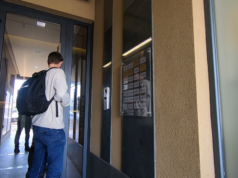Esma Redzepova, the Macedonian singer who was acclaimed for decades as the greatest female voice in Romany (Gypsy) music, died on Sunday in Skopje, the capital of Macedonia. She was 73.
The cause was pneumonia, her cousin and tour manager, Sani Rifati, said.
Often billed as “Queen of the Gypsies,” Ms. Redzepova sang in more than 10 languages and recorded more than 500 songs. In the Balkans, her hits reached multiple generations.
When she sang about unrequited love, adversity or pride in the Romany culture, her voice was a caldron of emotions. It could be a raspy shout, a sob, a nuanced tease, a model of long-breathed purity or an invitation to dance.
Battling prejudice against her culture, Ms. Redzepova was a pioneer in bringing wider recognition and respect to Romany music. Songs she sang in the Romany language were played on the radio well beyond Macedonia, and she toured concert halls as early as the 1960s.
Across her huge repertoire, she was variously an upholder of tradition, a seeker of musical connections and an eclectic modernizer. In 2006, one of her first and most widely beloved songs, “Chaje Shukarije” (“Beautiful Girl”), was heard behind the opening credits of Sacha Baron Cohen’s hit movie comedy “Borat” — although that placement deeply displeased her.
She was also a humanitarian and cultural activist who sought to preserve Roma tradition and expand Roma women’s rights. In the 1970s and ’80s she raised 47 foster children, who studied music at a school she founded with her husband. Some went on to accompany her onstage.
She performed more than 1,000 benefit concerts — for orphanages, hospitals, refugees and disabled people, among other causes — and worked on behalf of Roma refugees from Kosovo, for which she was named an honorary president of the Macedonia Red Cross.
Over the last decade, according to the anthropologist Carol Silverman, Ms. Redzepova had been building the Home of Humanity and Museum of Romany Music in Skopje, including an archive, a theater, a recording studio and an outpatient clinic for underserved populations.
Ms. Redzepova was born on Aug. 8, 1943, in Skopje. (At that time, Skopje was part of the Kingdom of Bulgaria. It was rejoined with Yugoslavia until the Republic of Macedonia declared independence in 1991.)
She was the youngest of six children. Her father, a singer and drummer, performed at weddings, and her family encouraged her to learn Romany music while in elementary school.
In 1956, her school’s principal urged her to enter a music contest on Radio Skopje. She won. One listener was Stevo Teodosievski, an ethnic Macedonian composer and accordionist, who went on to become her mentor, manager, bandleader and, in 1968, her husband.
Mr. Teodosievski helped persuade Ms. Redzepova’s parents to let her go to Belgrade, the capital of Yugoslavia, where she studied for two years at the Academy of Music and then joined his ensemble. She promised her father she would not sing at bars or restaurants. She made her first album with the Ansambl Teodosievski in 1961, including “Chaje Shukarije,” which she had written when she was 9 years old.
Based in Belgrade, the group recorded and performed most extensively in the 1960s and ’70s: Roma traditional and traditionalist songs, Macedonian songs, even psychedelia-tinged pop songs. Ms. Redzepova became one of Yugoslavia’s first television-era pop stars, famous for her colorful turbans — she had more than 300 of them — as well as her voice.
She toured worldwide, becoming the first Yugoslav musician to appear at the Olympia in Paris and appearing repeatedly in Europe, the Americas and India, the ancestral home of the Roma people. (Hindi was among the languages she sang in.) At the first Gypsy World Music Festival, a gathering of Roma musicians from 23 countries held in India in 1976, she was crowned Queen of Romany Songs by Prime Minister Indira Gandhi. In 2000, at the Festival of Roma Experiences in Moscow, she was named laureate and Roma Singer of the Century.
In 1989, as Yugoslavia was breaking up, she and her husband returned to live in Skopje. She continued to record, including a 1994 duet album with Usnija Jasarova, “Songs of a Macedonian Gypsy,” that was rereleased by Smithsonian Folkways in 2004.
Mr. Teodosievski died in 1997, and Ms. Redzepova had no immediate survivors.
After her husband’s death, she continued to record and perform until very recently. In 2001 she was a showstopper during Gypsy Caravan, a United States tour by five international Romany groups that was filmed for a 2006 documentary, “Tales of a Gypsy Caravan.”
Ms. Redzepova was furious when she first heard “Chaje Shukarije” in “Borat.” “Everyone is using my song without even informing me about it,” she told the Serbian newspaper Politika in 2006. She sued Mr. Baron Cohen, the film’s star and producer, and won a judgment for 26,000 euros (about $36,000); as it turned out, her production house had licensed the song without her knowledge.
Ms. Redzepova was widely honored. In 2010, the president of Macedonia gave her the Macedonian Order of Merit, and in 2013 she was proclaimed a National Artist of Macedonia. She was seen worldwide, in a duet with the pop singer Vlatko Lozanoski (or Lozano), as Macedonia’s entry for the 2013 Eurovision Song Contest.
“Songs of a Macedonian Gypsy” included “Esma’s Song,” which declares, “He who listens to me when I sing will be joyous at heart./Come, we will all sing together and sorrow and care will be forgotten, for singing cures all pain.”




